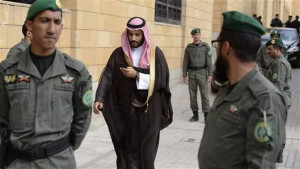
The local newspaper “Arab News” called the visit “successful”, and the agreements concluded during it – opening the door to cooperation between the two “oil giants”.
This opinion was generally shared by the rest of the media, as evidenced by their headlines: “Two hours of negotiations: the convergence of Saudi Arabia and Russia,” “A new era of relations between Russia and the Kingdom,” “Saudi-Russian pragmatism,” etc.
Many authors recall that Soviet Russia was the first country in the world to recognize the independence of the Saudi kingdom in 1926. At the same time, relations between the two countries have since then experienced ups and downs, going through periods of mutual alienation.
They acquired a stable character in the last two decades, especially after the visits of the leaders of the two countries in 2003 and 2007. It was noted in the media that the top leadership of the two countries agree that the current level of bilateral economic and trade relations does not correspond to the volume of their economies.
They believe that the crucial point of the visit of the distinguished guest from Saudi Arabia, who ranks third in the hierarchy of power after the accession in early 2015 of King Salman, was finding a common denominator to remedy this situation.
Saudi analysts, perhaps for the first time in recent years, have recognized the great potential and possibilities of Russia in the field of modern technologies and scientific developments.
The Russian Federation is at the forefront of the production of equipment for nuclear power, and it is preferential to reach out toRussian companies, says Dr. Fahd Bin Juma in the newspaper “Riyadh” in the light of the plans of the Kingdom to develop this industry. It is planned to build 16 reactors for nuclear power plants in the coming 20 years, costing more than 80 billion dollars.
Russia has a lot of experience in the mass construction of housing, space research, energy, and education, which is valuable for training Saudis, etc.
Concerning the international dimensions of his visit to the Russian Federation and the negotiations, a number of authors believe that relying on an alliance with only one power in the modern era is short-sighted. In the last ten years, the Kingdom has realized this and turned its eyes to China, India, France, and finally to Russia.
The Saudis stress that most of the Russian territory is in Asia. The Kremlin is now aware of the importance of the East in the global balance of power and its political, economic, and other presences in the region.
According to the local newspaper “Okaz”, the position of Russia on a number of issues, in particular Syria, is at odds with the Saudi position. In the words of Dr. Zuhair Al-Harthi, a member of the Shura Council, the prevailing view is that the two countries share more than what divides them. The diversification of Riyadh’s relations with an eye to the Eastern bloc will benefit the Kingdom.
The media of the Kingdom is resonating with the thesis that the current challenges of the Middle East region somehow push Riyadh and Moscow to move towards each other in the search for common ground. One reason for this is the rise of terrorism in the region and the specifics of the fight against it, especially against ISIL.
Some local experts say that the coming months will show an even greater convergence of views on both sides. Whether these statements are a tribute to conjunctures of the moment or reflect a request to go to a new level of bilateral cooperation, time will tell.
It is noteworthy that this was the first visit to Russia by the 35-year-old Prince Muhammad bin Salman, who ranks third in the power hierarchy of the country, and represents the third generation of the ruling House of Saud.
He is the son of the reigning King and one of the grandsons of Ibn Saud, the founder of the state. Ibn Saud, who died in 1953, had 37 princely sons from different wives.
According to the order of succession in the KSA, the title of the monarch passes from brother to brother within the ruling family in order of seniority. This tradition has contributed to the long-term tenure of the elderly on the throne.
It is now obvious that the new generation of princes, who grew and developed in different socio-political conditions compared with their fathers, shall be attached to the rule of the kingdom.
Yuri Zinin, Senior Research Fellow at the Moscow State Institute of International Relations (MGIMO), exclusively for the online magazine “New Eastern Outlook”.
